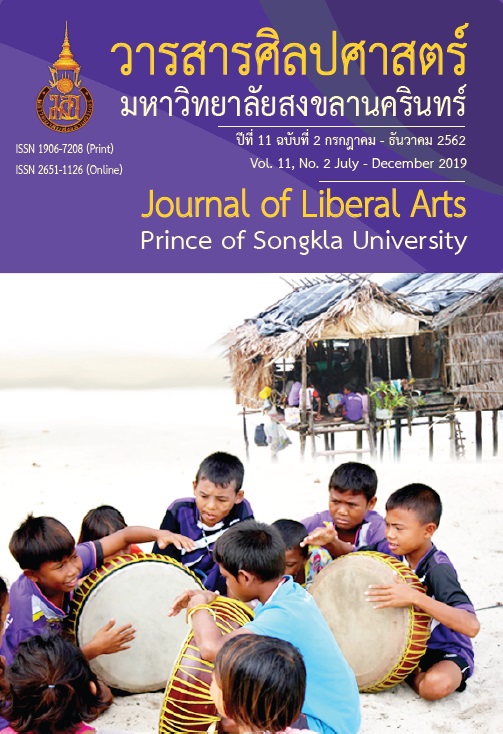Moken Ethnic Groups: The Marginalization and Construction of Social Space under Thai Nation – State
Keywords:
Social space, Moken ethnic groups, Thai citizensAbstract
This article aimed to explain the construction of social space of the Moken ethnic groups in Koh Lao, Koh Chang and Koh Phayam, Ranong province of Thailand. Using field research Method, data were collected by observations and in-depth interviews with 15 persons of Moken ethnic groups, 5 related persons and document research. The data were classified according to the issues, decoded, interpreted and presented by means of description. It was found that although the Moken ethnic groups were marginalized, they did not accept that status and attempted to get Thai citizenship in various ways through everyday life. This article reflects that, Most moken ethnic groups are not recognized as both legal and social citizens. They have no access to public services, thus creating a social space to get more recognition.
References
Arunotai, N. (2006). Civil society and community strength in the context of marginalized group: The case of sea nomads in Thailand. Bangkok: The Thailand Research Fund. [in Thai]
Blitz, B. K. & Maureen Lynch. (2009). Statelessness and the Benefits of citizenship: A comparative study. UK : Oxford Brookes University.
Charoensin-o-larn, C. (2012). Semiology structuralism poststructural with study political science. Bangkok: Vibhasa. [in Thai]
Intasena, A., Hongsuwan, P. & Wannakit, N. (2018). Tales and the Creation of a social network of the Isan displaced persons. Social Sciences Research and Academic Journal, 12(34), 67-82. [in Thai]
Kan Chana Chittra Sai Sunthon, P. (2007, June 25). Nationality Act. Retrieved from file:///C:/Users/Administrator/Downloads/451.pdf/. [in Thai]
Kittitornsakul, K. (2017). Chinese investors and the identity rebuilding of Chiang Mai in 1950s. Journal of Liberal Arts, Prince of Songkla University. 9(2), 238 - 258. [in Thai]
Kumpetch, J. (2012). Urban space and everyday life in Soi Cowboy. Bangkok : Srinakharinwirot University. [in Thai]
Maatsch, A. (2011). Ethnic citizenship regimes: Europeanization, post-war migration. London: Saffron House.
Minahan, J. (2016). Encyclopedia of stateless nations : Ethnic and national groups around the world. California : Greenwood.
Lom-on, T. (2014). Khamu Rim Kong: Marginality and social space construction. Journal of Social Science. 28(2), 93 - 114.
Ranong Provincial Administration Office. (2016). Agenda of the provincial committee for rehabilitation of the Chao Lon lifestyle. Ranong: Ranong Provincial Administration Office. [in Thai]
Sriram, N. (2014). Academic instruction document sets out public service of local government units 1-7. Bangkok: Sukhothai Thammathirat Open University. [in Thai]
Santasombat, Y. (2015). Ethnicity under the mastermind neoliberalism. in Duangwises, N., Saisamphan, P. & Chaisingkananont, S. (2015). Ethnicity under power: Sounds of ethnicity in the neoliberalism. (p. 43 - 61). Bangkok: Princess Maha Chakri Sirindhorn Anthropology Centre (Public Organisation). [in Thai]
Thongkaew, K. (2018). The capacity building of Tai Song Dam ethnic community in Chumphon Province. Journal of Inthanin Thaksin San. 12(3), 9-31. [in Thai]
Yuenyong, p. and Rak Phonlamueang, C. (2017). An analysis of the learning process of new social movement in the Mekong River basin wartershed natural resource Management. Journal of Kharusat. 43(4), 45 - 62. [in Thai]
Downloads
Published
How to Cite
Issue
Section
License
The authors retain the copyright to their article but the Journal of Liberal Arts, Prince of Songkla University reserves the exclusive rights to first publication.






